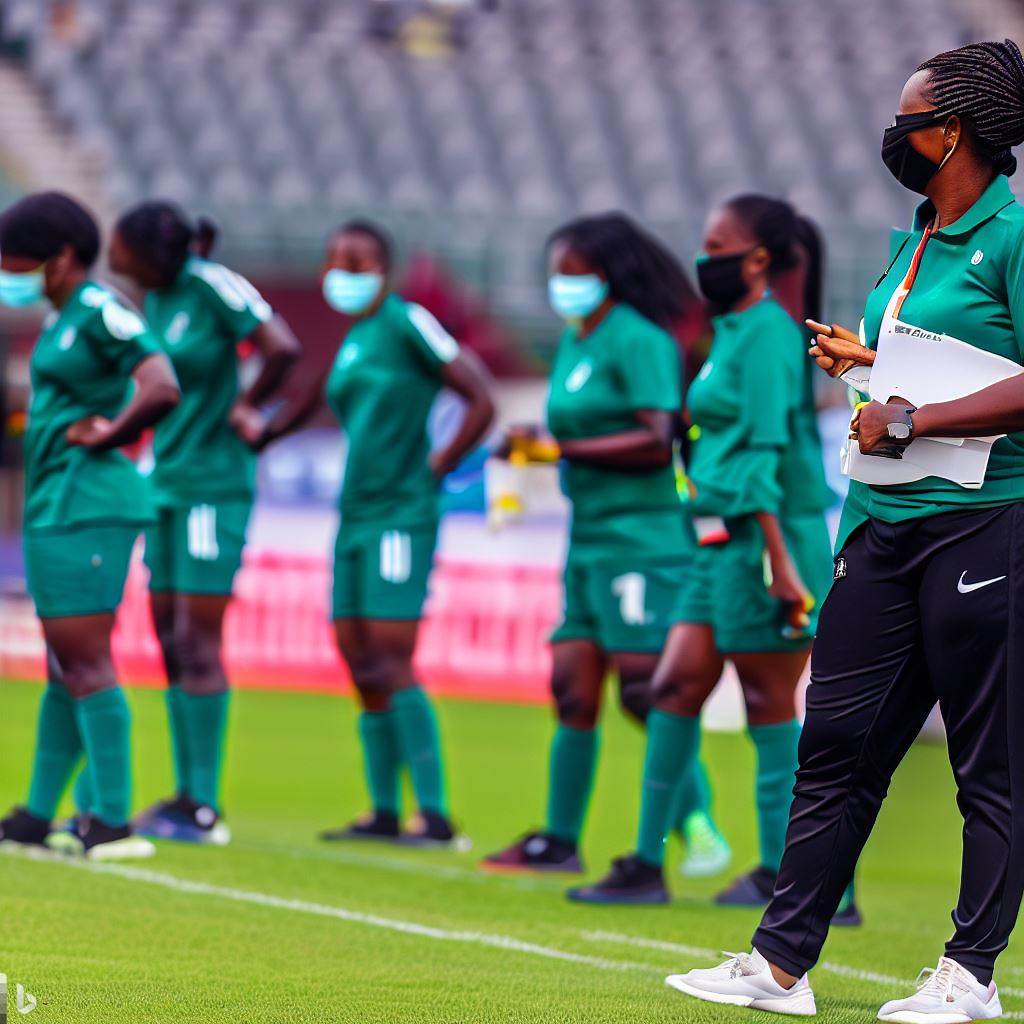Introduction
Athletic Training in Nigeria
- Athletic training is a burgeoning field in Nigeria, gaining recognition for its vital role in sports.
- In this article, we’ll walk you through the steps to become a certified athletic trainer in Nigeria.
- From football to athletics, athletic trainers play a pivotal role in athlete well-being and performance.
The Significance of Athletic Trainers
- Athletic trainers are essential for preventing and managing sports-related injuries.
- They ensure athletes perform at their best by providing injury prevention strategies and rehabilitation.
- Athletic trainers contribute to the overall development of sports in Nigeria, improving performance and safety.
- This guide will equip you with the knowledge and steps to join this rewarding profession.
What is an Athletic Trainer?
Athletic trainers play a crucial role in sports medicine, focusing on injury prevention and rehabilitation.
Definition and role of an athletic trainer
- An athletic trainer is a healthcare professional specialized in preventing and treating musculoskeletal injuries.
- They work with athletes, coaches, and other healthcare professionals to ensure their optimal performance and well-being.
- They provide immediate care for injuries, assess conditions, and develop treatment plans.
- They also educate athletes about injury prevention techniques and safe training practices.
- Overall, athletic trainers play a vital role in the overall health and success of athletes.
Key responsibilities in sports medicine
- Athletic trainers evaluate and treat acute and chronic injuries, such as sprains, strains, and fractures.
- They develop rehabilitation programs, including therapeutic exercises and modalities, to aid athletes’ recovery.
- They collaborate with healthcare professionals, such as physicians and physical therapists, to provide comprehensive care.
- They also manage medical emergencies and ensure athletes’ safety during practice and competitions.
- Moreover, athletic trainers may assist in designing conditioning and nutrition programs for athletes.
Importance of athletic trainers in injury prevention and rehabilitation
- Athletic trainers play a significant role in preventing injuries by implementing proper training techniques and safety measures.
- They provide athletes with valuable knowledge about warm-up exercises, stretching routines, and proper equipment usage.
- By focusing on injury prevention, athletic trainers help athletes stay on top of their game and avoid potential setbacks.
- In case of injuries, athletic trainers initiate immediate care and guide athletes through the recovery process.
- They create customized rehabilitation plans, monitor progress, and ensure athletes regain their strength and functionality.
- Their expertise also helps in reducing the risk of re-injury and promoting long-term athletic development.
In essence, athletic trainers in Nigeria play a vital role in sports medicine by providing preventive care, immediate injury treatment, and comprehensive rehabilitation programs.
They are instrumental in ensuring athletes’ well-being, optimizing their performance, and minimizing the risk of injuries in the long run.
Read: Women in Sports Leadership: Athletic Directors in Nigeria
Education and Qualifications
Undergraduate degree in sports science or related field
To become an athletic trainer in Nigeria, you need to start by earning an undergraduate degree in sports science or a related field.
- In order to gain a strong foundation in this field, it is important to choose a reputable institution that offers a comprehensive curriculum.
- During your undergraduate studies, you will learn about topics such as anatomy, exercise physiology, orthopedic assessment, biomechanics, and injury prevention.
- It is essential to excel in your coursework and maintain a high GPA to enhance your chances of advancing to the next step.
Required certifications and licenses
Along with an undergraduate degree, there are specific certifications and licenses required to become a certified athletic trainer in Nigeria.
- The most important certification is the Certified Athletic Trainer (ATC) certification, which is offered by the Board of Certification, Inc.
- To obtain this certification, you must complete a bachelor’s degree, meet certain coursework requirements, and pass the ATC examination.
- Additionally, you will need to obtain a license from the Medical Rehabilitation Therapists Board of Nigeria (MRTBN).
Internship and practical experience in athletic training
Practical experience and internships are crucial for aspiring athletic trainers in Nigeria.
- Many universities and organizations offer internship programs that allow students to gain hands-on experience in athletic training.
- During these internships, you will have the opportunity to work under the supervision of experienced athletic trainers.
- You will learn how to assess and treat injuries, develop rehabilitation programs, and provide emergency care.
- Internships also provide valuable networking opportunities and may lead to job offers or further educational opportunities.
Overall, the path to becoming an athletic trainer in Nigeria requires a combination of education, certifications, licenses, and practical experience.
By earning an undergraduate degree in sports science or a related field, you will develop a strong foundation in the necessary knowledge and skills.
Obtaining the Certified Athletic Trainer (ATC) certification and a license from the Medical Rehabilitation Therapists Board of Nigeria (MRTBN) are essential steps in becoming a recognized athletic trainer.
Finally, gaining practical experience through internships and on-the-job training will allow you to apply your knowledge and develop crucial skills in this field.
By following these steps, you will be one step closer to achieving your goal of becoming an athletic trainer in Nigeria.
Read: Nurturing Talent: Youth Coaching in Nigeria
Steps to Becoming an Athletic Trainer in Nigeria
Research and gather information
To become an athletic trainer in Nigeria, start by researching and gathering information about the profession.
Learn about the job requirements, skills needed, and career prospects.
Choose the right educational institution
Select a reputable educational institution that offers programs in sports science or athletic training.
Consider factors such as curriculum, faculty, facilities, and resources.
Pursue an undergraduate degree in sports science
Enroll in a sports science program to acquire the necessary knowledge and skills.
Focus on courses related to anatomy, physiology, exercise science, and injury prevention and treatment.
Gain practical experience through internships and volunteering
To enhance your practical skills, participate in internships or volunteering opportunities at sports clinics, hospitals, or athletic teams.
This hands-on experience is invaluable for your career development.
Obtain necessary certifications and licenses
After completing your degree, obtain certifications such as the National Athletic Trainers’ Association (NATA) certification.
Additionally, check if there are any specific licenses required in Nigeria.
Continual professional development and networking opportunities
To excel as an athletic trainer, engage in continual professional development activities, such as attending workshops, conferences, and seminars.
Networking with other professionals in the field can also open up opportunities.
By following these steps, you can set yourself on the path to becoming a successful athletic trainer in Nigeria.
Remember, it requires dedication, hard work, and a passion for sports and helping others.
Read: Educational Paths for Nigerian Strength Coaches

See Related Content: The Role of a Sports Information Director in Nigeria
Career Opportunities for Athletic Trainers in Nigeria
When pursuing a career as an athletic trainer in Nigeria, there are various avenues where you can find employment opportunities.
These include:
Sports teams and organizations
Athletic trainers are in high demand by sports teams and organizations in Nigeria.
These include professional sports clubs, national sports teams, and even youth sports clubs.
Joining a sports team or organization allows athletic trainers to work hands-on with athletes and provide their expertise in injury prevention, rehabilitation, and performance enhancement.
Fitness centers and gyms
Fitness centers and gyms also require the services of athletic trainers to support their clients in achieving their fitness goals.
As an athletic trainer in a fitness center or gym, you can work with individuals of varying fitness levels, providing personalized training plans, as well as injury prevention and rehabilitation support.
Hospitals and clinics
Athletic trainers can find employment opportunities in hospitals and clinics, where they can work alongside doctors, physiotherapists, and other healthcare professionals.
In these settings, athletic trainers assist in the diagnosis, treatment, and rehabilitation of injuries, working with patients from diverse backgrounds.
Educational institutions
Many educational institutions in Nigeria, from primary schools to universities, have sports programs that require the expertise of athletic trainers.
Athletic trainers can be employed by these institutions to ensure the well-being of student-athletes, provide injury prevention programs, and offer support in managing injuries sustained during sports activities.
Private practice or freelance opportunities
Some athletic trainers in Nigeria prefer to establish their own private practice or work as freelancers.
This allows them to have more control over their schedule and client base.
Private practice or freelance opportunities can involve working with individual athletes, providing services such as injury rehabilitation, fitness training, and performance enhancement.
Overall, the career opportunities for athletic trainers in Nigeria are diverse and promising.
Whether you choose to work with sports teams, in fitness centers, hospitals, educational institutions, or establish your own practice, there is a growing demand for your skills and expertise in the field of sports medicine.
Read: Challenges of an Assistant Coach in Nigerian Sports
Challenges and Rewards of Being an Athletic Trainer in Nigeria
Being an athletic trainer in Nigeria comes with its fair share of challenges, but it is also a rewarding and fulfilling profession.
Despite the limitations and obstacles, athletic trainers play a crucial role in supporting athletes and helping them achieve their goals.
One of the main challenges in this profession is navigating the limited resources and infrastructure for sports medicine in Nigeria.
The lack of funding and proper facilities can make it difficult to provide high-quality care to athletes.
Additionally, there is a need to raise awareness and educate the public about the importance of athletic trainers in preventing and managing sports-related injuries.
Another major challenge is the scarcity of qualified professionals and educational opportunities in the field.
This scarcity hinders the growth and development of sports medicine in Nigeria, making it crucial for aspiring athletic trainers to seek international certifications and continuous learning.
However, despite these challenges, being an athletic trainer in Nigeria is incredibly rewarding.
Witnessing the growth and progress of athletes under your care, both physically and mentally, is immensely fulfilling.
Playing a role in their success by keeping them healthy and ready to perform can be a source of pride and accomplishment.
The bond formed with athletes goes beyond the realm of healthcare.
As an athletic trainer, you become a vital member of their support system, building relationships that can last a lifetime.
The satisfaction of helping individuals recover from injuries and watching them return to play is unparalleled.
Moreover, the Nigerian sports industry offers unique experiences and opportunities for athletic trainers.
Working with diverse sports such as football, basketball, track and field, and traditional sports allows trainers to expand their knowledge and expertise.
The vibrant and passionate sports culture creates an exciting work environment.
Adapting to various environments, from local clubs to national teams, adds versatility and adaptability to the profession.
Athletic trainers also have the chance to travel and work with athletes at regional, continental, and international competitions, exposing them to different levels of competition and enhancing their professional growth.
By being part of the sports industry in Nigeria, athletic trainers have the power to shape the future of sports medicine in the country.
They can influence policy changes and advocate for better resources, education, and recognition for their profession.
Basically, despite the challenges faced as an athletic trainer in Nigeria, the rewards and fulfillment that come with helping athletes achieve their goals make it a highly satisfying profession.
The unique experiences and opportunities in the Nigerian sports industry only add to the allure of becoming an athletic trainer in this country.
Conclusion
Recap of the importance of athletic trainers
Throughout this article, we have emphasized the crucial role athletic trainers play in sports.
They are essential for preventing and managing injuries, ensuring athletes’ health and well-being, and enhancing their performance.
Encouragement for aspiring athletic trainers in Nigeria
If you aspire to become an athletic trainer in Nigeria, don’t be discouraged.
Despite the challenges, there are opportunities for you to pursue your passion and make a difference in the sports industry.
With determination and the right steps, you can achieve your goals.
Final thoughts and call-to-action statement
In summary, becoming an athletic trainer in Nigeria requires dedication, education, and experience.
It is a rewarding career that allows you to contribute to the athletic community and positively impact athletes’ lives.
If you believe in the power of sports medicine, take the first step and embark on this fulfilling journey.
Start by researching educational programs, gaining practical experience, and networking with professionals in the field.
Your dream of becoming an athletic trainer in Nigeria is within reach – seize the opportunity today!




